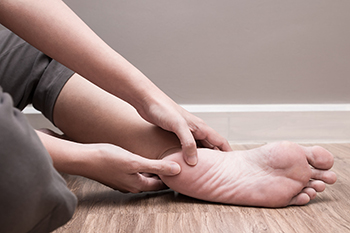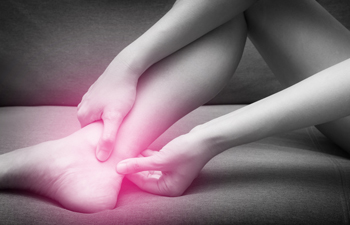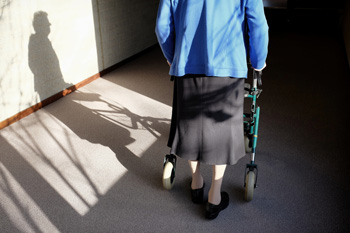Connect With Us
Blog
 Heel pain can occur at any age, and it can come from a variety of causes. Plantar fasciitis is the most common source of heel pain. It occurs when the band of tissues that connects the heel to the toes, known as the plantar fascia, becomes inflamed. This condition can then cause the plantar fascia to pull on the heel and give it stress. It can also lead to heel spurs, which are calcium deposits that form on the bottom of the heel bone and become painful when bearing weight. Fat pad atrophy is another common source of heel pain. It occurs when the fat underneath the heel begins to wear away. Growing children who are active between the ages of 8 and 13 are susceptible to Sever’s disease. This is a result of the calf muscles growing faster than the Achilles tendon and causing the muscles to pull on the heel. Because of how debilitating heel pain can be to everyday life, patients who are struggling with any of these conditions may wish to consult with a podiatrist for a proper diagnosis and treatment.
Heel pain can occur at any age, and it can come from a variety of causes. Plantar fasciitis is the most common source of heel pain. It occurs when the band of tissues that connects the heel to the toes, known as the plantar fascia, becomes inflamed. This condition can then cause the plantar fascia to pull on the heel and give it stress. It can also lead to heel spurs, which are calcium deposits that form on the bottom of the heel bone and become painful when bearing weight. Fat pad atrophy is another common source of heel pain. It occurs when the fat underneath the heel begins to wear away. Growing children who are active between the ages of 8 and 13 are susceptible to Sever’s disease. This is a result of the calf muscles growing faster than the Achilles tendon and causing the muscles to pull on the heel. Because of how debilitating heel pain can be to everyday life, patients who are struggling with any of these conditions may wish to consult with a podiatrist for a proper diagnosis and treatment.
Many people suffer from bouts of heel pain. For more information, contact one of our podiatrists of Sutera and Jones Surgical Podiatry. Our doctors can provide the care you need to keep you pain-free and on your feet.
Causes of Heel Pain
Heel pain is often associated with plantar fasciitis. The plantar fascia is a band of tissues that extends along the bottom of the foot. A rip or tear in this ligament can cause inflammation of the tissue.
Achilles tendonitis is another cause of heel pain. Inflammation of the Achilles tendon will cause pain from fractures and muscle tearing. Lack of flexibility is also another symptom.
Heel spurs are another cause of pain. When the tissues of the plantar fascia undergo a great deal of stress, it can lead to ligament separation from the heel bone, causing heel spurs.
Why Might Heel Pain Occur?
- Wearing ill-fitting shoes
- Wearing non-supportive shoes
- Weight change
- Excessive running
Treatments
Heel pain should be treated as soon as possible for immediate results. Keeping your feet in a stress-free environment will help. If you suffer from Achilles tendonitis or plantar fasciitis, applying ice will reduce the swelling. Stretching before an exercise like running will help the muscles. Using all these tips will help make heel pain a condition of the past.
If you have any questions please contact one of our offices located in Media, Glen Mills, Riddle Memorial Hospital, and Concordville, PA . We offer the newest diagnostic and treatment technologies for all your foot and ankle needs.
The Achilles tendon is a band of fibrous tissue that connects your calf muscles to your heel bone. Though this tendon is tough, it can tear or rupture during physical activity. A ruptured Achilles tendon can cause many symptoms, including a sharp, sudden pain at the back of the ankle, difficulty walking, weakness, and an inability to raise the injured foot. Some people are able to walk or continue playing sports with a ruptured Achilles tendon due to the surrounding muscles compensating. However, this can make the injury worse. A rupture can be treated conservatively or with surgery. Conservative treatment typically involves immobilizing the injured leg with a cast to allow it to heal. Surgery repairs the ruptured tendon. If you believe that you may have ruptured your Achilles tendon, it is strongly suggested that you seek the care of a podiatrist.
Achilles tendon injuries need immediate attention to avoid future complications. If you have any concerns, contact one of our podiatrists of Sutera and Jones Surgical Podiatry. Our doctors can provide the care you need to keep you pain-free and on your feet.
What Is the Achilles Tendon?
The Achilles tendon is a tendon that connects the lower leg muscles and calf to the heel of the foot. It is the strongest tendon in the human body and is essential for making movement possible. Because this tendon is such an integral part of the body, any injuries to it can create immense difficulties and should immediately be presented to a doctor.
What Are the Symptoms of an Achilles Tendon Injury?
There are various types of injuries that can affect the Achilles tendon. The two most common injuries are Achilles tendinitis and ruptures of the tendon.
Achilles Tendinitis Symptoms
- Inflammation
- Dull to severe pain
- Increased blood flow to the tendon
- Thickening of the tendon
Rupture Symptoms
- Extreme pain and swelling in the foot
- Total immobility
Treatment and Prevention
Achilles tendon injuries are diagnosed by a thorough physical evaluation, which can include an MRI. Treatment involves rest, physical therapy, and in some cases, surgery. However, various preventative measures can be taken to avoid these injuries, such as:
- Thorough stretching of the tendon before and after exercise
- Strengthening exercises like calf raises, squats, leg curls, leg extensions, leg raises, lunges, and leg presses
If you have any questions please feel free to contact one of our offices located in Media, Glen Mills, Riddle Memorial Hospital, and Concordville, PA . We offer the newest diagnostic tools and technology to treat your foot and ankle needs.
Keeping aging adults ambulatory is considered by many to be essential. Mobility is believed to provide the elderly with dignity, independence, and self-esteem. Foot care plays an important part in the aging adult’s mental health and quality of life, and it should be equal to care they receive for other parts of their body. This is particularly true for elderly patients with chronic diseases, like diabetes. Older adults should be educated on proper foot care, and have their foot health regularly monitored and assessed by a podiatrist. This is important to help the older adults stay mobile while avoiding complications that can result from a foot condition that is ignored or goes undetected. To help ensure your foot health or that of your loved one, it's a good idea to make an appointment with a podiatrist today.
If you need your feet checked, contact one of our podiatrists of Sutera and Jones Surgical Podiatry. Our doctors will attend to all of your foot and ankle needs and provide you with quality treatment.
Geriatrics and Podiatry
When people age, some common issues that may occur are bone density loss, dry skin, poor circulation, and rough brittle nails. These issues may also affect your foot health if the necessary steps are not taken to alleviate the problems.
It is important to take care of your feet because feet that are injured or diseased can affect your overall health. Having painful feet hinders your ability to do daily activities or may decrease your willingness to do the things that you need to do.
Visiting Your Geriatrician
As we age, health problems become more likely, so it is essential to visit your doctor for check-ups to ensure that you are doing the best you can to take care of your health. It is recommended to check your feet frequently for any possible cuts, bruises, swelling, corns or any other irregularities.
Taking Care of Elderly Feet
Cracked or dry feet can be treated by applying moisturizer often. It is also important not to wear old socks because the older the sock is, the higher the possibility there will be that there is bacteria there. Wear fresh socks and make sure they fit properly.
Proper foot health means that you can have a more active lifestyle and you will not be bogged down by pain. Foot health also leads to good circulation, which is paramount for overall health.
If you have any questions, please feel free to contact one of our offices located in Media, Glen Mills, Riddle Memorial Hospital, and Concordville, PA . We offer the newest diagnostic tools and technology to treat your foot and ankle needs.
Blog Archives
- April 2024
- March 2024
- February 2024
- January 2024
- December 2023
- November 2023
- October 2023
- September 2023
- August 2023
- July 2023
- June 2023
- May 2023
- April 2023
- March 2023
- February 2023
- January 2023
- December 2022
- November 2022
- October 2022
- September 2022
- August 2022
- July 2022
- June 2022
- May 2022
- April 2022
- March 2022
- February 2022
- January 2022
- December 2021
- November 2021
- October 2021
- September 2021
- August 2021
- July 2021
- June 2021
- May 2021
- April 2021
- March 2021
- February 2021
- January 2021
- December 2020
- November 2020
- October 2020
- September 2020
- August 2020
- July 2020
- June 2020
- May 2020
- April 2020
- March 2020
- February 2020
- January 2020
- December 2019
- November 2019
- October 2019
- September 2019
- August 2019
- July 2019
- June 2019
- May 2019
- April 2019
- March 2019
- February 2019
- January 2019
- December 2018
- November 2018
- October 2018
- September 2018
- August 2018
- July 2018
- June 2018
- May 2018
- April 2018
- March 2018
- February 2018
- January 2018
- December 2017
- November 2017
- October 2017
- September 2017
- August 2017
- July 2017
- June 2017
- May 2017
- April 2017
- March 2017
- February 2017
- January 2017
- December 2016
- November 2016
- October 2016
- September 2016
- August 2016
- July 2016
- June 2016
- May 2016
- April 2016
- March 2016
- February 2016
- January 2016
- December 2015
- November 2015
- October 2015
- September 2015
- August 2015
- July 2015
- June 2015
- May 2015
- April 2015
- March 2015
- February 2015
- January 2015
- December 2014
- November 2014
- October 2014
- September 2014






